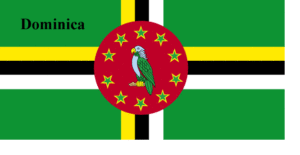 Dominica’s government recognizes the fundamental role of education toward the social well-being and economic prosperity of the Commonwealth’s citizens. 94% of Dominicans are literate, and school attendance for children between the ages of 5 and 16 is free and compulsory. Government-operated and private and church-sponsored schools serve some 70,000 students throughout the island.
Dominica’s government recognizes the fundamental role of education toward the social well-being and economic prosperity of the Commonwealth’s citizens. 94% of Dominicans are literate, and school attendance for children between the ages of 5 and 16 is free and compulsory. Government-operated and private and church-sponsored schools serve some 70,000 students throughout the island.
Primary schools are open to students ages 5 to 11, while Commonwealth secondary schools are divided into two divisions: junior, for students aged 12 to 14; and senior, for students older than 14.
At the end of secondary education, most students take Caribbean Secondary Education Certificate (CSEC) exams administered by the Caribbean Examinations Council (CXC). Scoring for the examinations are as follows, with the overall grade reflecting the student’s performance on the unit as a whole while the profile grade reflects performance on each module of the unit.
|
Overall Grades |
Profile Grades |
Description |
|---|---|---|
|
I |
A |
Candidate shows a comprehensive grasp of the key concepts, knowledge, skills and competencies required by the syllabus. |
|
II |
B |
Candidate shows a good grasp of the key concepts, knowledge, skills and competencies required by the syllabus. |
|
III |
C |
Candidate shows a fairly good grasp of the key concepts, knowledge, skills and abilities required by the syllabus. |
|
IV |
D |
Candidate shows a moderate grasp of the key concepts, knowledge, skills and competencies required by the syllabus. |
|
V |
E |
Candidate shows a very limited grasp of the key concepts, knowledge, skills and competencies required by the syllabus. |
|
VI |
F |
Candidate shows a very limited grasp of the key concepts, knowledge, skills and competencies required by the syllabus. |
Grading scales vary in higher education. The following is the grading scale for Dominica State College:
|
Grade |
Description |
Points |
Percentage |
|---|---|---|---|
|
A+ |
Excellent Work |
4.00 |
90-100 |
|
A |
|
3.75 |
85-89 |
|
A- |
|
3.50 |
80-84 |
|
B+ |
Good Work |
3.25 |
75-79 |
|
B |
|
3.00 |
70-74 |
|
B- |
|
2.75 |
65-69 |
|
C+ |
Satisfactory Work |
2.50 |
60-64 |
|
C |
|
2.25 |
55-59 |
|
C- |
|
2.00 |
50-54 |
|
D* |
Poor work but passing |
1.50 |
45-49 |
|
F* |
Unsatisfactory work |
0.00 |
0-44 |
* “D” and “F” grades are not acceptable for fulfillment of course and program requirements.
Dominica has set national learning-outcome curriculum standards for all primary and secondary school students, requiring literacy in all domains, including technology. In addition to reading, social studies, math and science, primary students study French and Spanish beginning at age 7. Secondary students must attain competence in mathematics, English, science, and social sciences, as well as in French or Spanish. They also may study information technology topics, including computer programming, and agriculture. Students at both primary and secondary levels are required to study health and family life, which encompasses a variety of practical and life skills training.
Post-secondary students have several options for furthering their education. Dominica Teachers Training College prepares educators under the auspices of the University of West Indies. Clifton Dupigny Community College offers one and two-year certificates in a variety of subjects including Banking and Finance, Accounting, and Management Studies. Students interested in healthcare careers may attend the Princess Margaret Hospital School of Nursing.
© 2025 Gaetranslations | Terms & Conditions
Website by: Timefortheweb